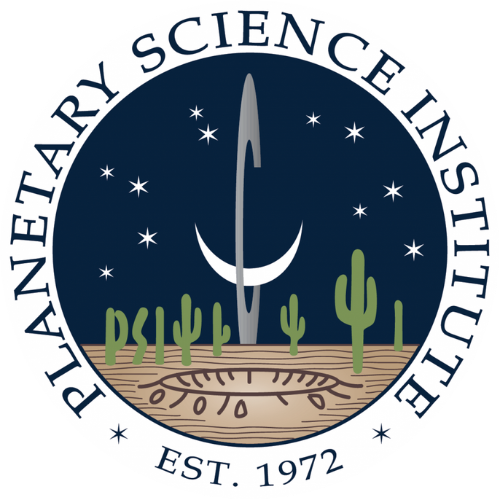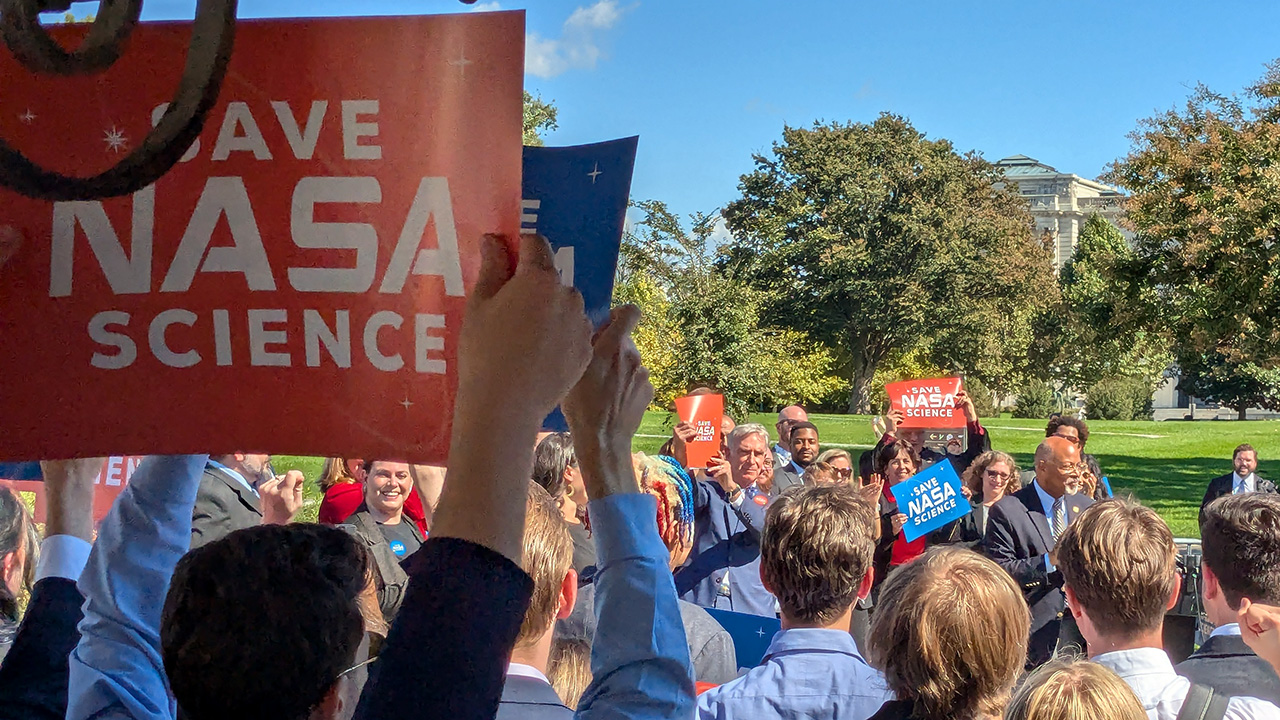During the government shutdown on Monday, Oct. 6, a cohort of Planetary Science Institute science staff joined hundreds of others on Capitol Hill for the Save NASA Science Day of Action organized by the Planetary Society and its CEO Bill Nye. The crowd – which also included leaders from 20 national science, education and space organizations – urged protection of science budgets of both NASA and the National Science Foundation (NSF).
NASA and the NSF’s budget is set by an annual process that begins with a proposal from the White House and ends with legislation passed by Congress and signed by the President. The White House’s 2026 budget proposal slashes NASA’s budget by an unprecedented 24%, reducing it from $24.8 billion to $18.8 billion, marking the largest single-year budget cut and lowest funding level in NASA’s history, adjusted for inflation. The cuts to NASA Science would be even worse, at 47%.

“This is not a luxury. It is a responsibility. Article One, clause eight of the U.S. Constitution recommends to Congress that they promote the progress of science and useful arts. It’s in the Constitution. When it comes to exploration, there is no private option,” Nye said during Monday’s press conference. “NASA Science is a bargain. For every dollar spent, at least three come back into the economy. Last year, NASA’s investment in science generated more than $20 billion of economic growth and supported over 80,000 jobs in all 50 states.”
PSI Director Amanda Hendrix was one of several PSI scientists participating in the Day of Action.
“We have PSIers in more than 35 states, and they bring NASA science dollars into 104 congressional districts – so PSI research has a significant economic impact across the country.”
The science staff from PSI who participated in the Day of Action include Director Amanda Hendrix, Senior Scientists Eddie Baron, Aileen Yingst, Cathy Weitz, Darby Dyar and Research Scientist Kirby Runyon.

“Visiting Congressional offices is one of the most impactful actions in a participatory democracy. If you can establish a connection, it can plant the seeds of change,” said Baron, who is based in Maryland, but visited the Oklahoma congressional offices since he lived there for much of his life and is still affiliated, as a professor emeritus, with the University of Oklahoma.
“Washington, D.C. is a very different place than it was even a year ago, so it was tough. A lot of people are angry right now, but it was also empowering to avail myself of my right to tell my duly elected representatives how things are going in their state,” said Yingst, who is based in Maine. “I did it even though I used my own funds to fly down, because it’s important to put my money where my mouth is. Now is not the time to leave anything on the table. I believe that generously-funded science research makes life better for my kids, and for everyone else’s kids; I want to protect that.”
“Even though I live a short distance from the Capitol, I’ve never visited the congressional offices so what an amazing experience to walk through the hallways where so much history has taken place,” said Weitz, who resides in Virginia. “I’m glad I got to attend this event and offer my personal experiences working at NASA so the representatives heard how harmful the budget cuts have been so far to the missions and projects I currently work on, and how much worse it will be should the President’s budget be enacted.”

“I came away from the experience with a morale boost!” said Dyar, who is based in Maine. “As the Deputy Principal Investigator of the VERITAS mission to Venus, I am committed to doing everything I can to make sure we fly on time. Because we (and so many other missions) were cut in the President’s budget and the language in the House Appropriations bill is rather fuzzy, I wanted to be there to get the word about VERITAS out there. I have also been continuously funded by NSF since 1987, so I also felt it was important to get a word in about the importance of both NSF and NASA in supporting students and fundamental research.”
The organizers sent Runyon, a D.C. resident, to visit the Michigan offices since that’s where he grew up.
“It energizes me to get to participate in Congressional action days. It makes me proud that our field brings out people’s optimism for knowing our place in space better and advocating for public funding,” he said.
“Beyond the impact of these potential budget cuts on our scientists, we are all passionate about the science itself and about maintaining NASA as a critical US institution,” says Hendrix. “It is so important that the US maintain strength and leadership in space science and exploration, for the benefit of taxpayers and for society.”

